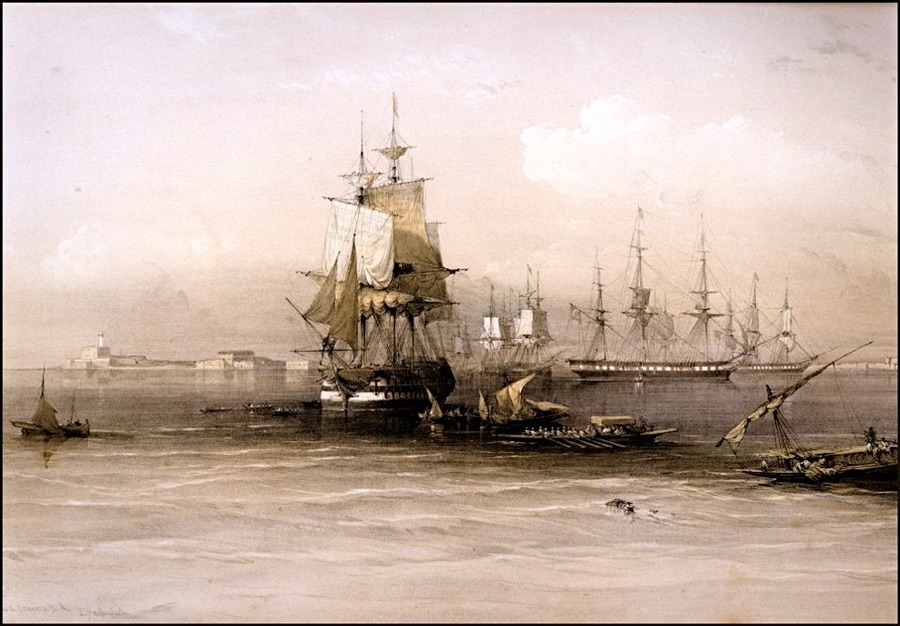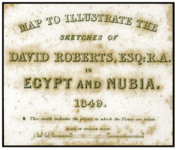APPROACH TO ALEXANDRIA
THOUGH little can be seen of this ancient city from the sea, owing to the low lands of the delta, yet few spots are approached under deeper emotions than those excited by its historical associations with the ancient land of which it was the chief port.
Its situation, chosen by the wisdom and power of the Macedonian conqueror, and bearing his name to the present hour, evince the forethought and profound judgment with which its local importance was estimated by him, as the outlet of commerce from the East, which, entering Egypt by the Red Sea, and traversing the Desert to Memphis, spread the luxuries of Arabia and Persia, and probably India, among the Egyptians. Alexander anticipated that it would become the emporium of the Western world. He selected the favourable position within the Island of Pharos, on the Delta of the Nile, that sheltered, as a breakwater, the western harbour, in which the ancient town of Rhacôtis lay, and there raised his immortal city. It was known from a remote period as a place of maritime refuge, and mentioned by Homer as a watering station in the time of the Trojan war. The history of commerce shows that Alexandria became, and continued during seventeen centuries, the port through which the riches of the East were poured into Europe; and if the discovery of the passage to India by the Cape of Good Hope had not been made, that intercourse would have continued unbroken: but, from that time, Alexandria sunk into insignificance. In our day, however, after an interruption of its prosperity as a port for nearly four centuries, its importance has been re-established by the discovery of the powers of stream; which has opened a communication between Bombay and London, with greater certainty, and in as short a time, as during the last century a journey could have been made from London to Rome. Fortunately for the re-establishment of this communication with India, Mehemet Ali governs in Egypt. His views and policy bear some resemblance to those of the original founder; instead of being narrowed by the bigotry and impolicy of his immediate predecessors, he has contributed, in allowing the transit by the Desert and the Nile, to the future prosperity of Egypt: and violent as may have been the exercise of his power in the re-establishment of Alexandria, it will become the least sullied portion of his fame in history.
The antiquities of Alexandria are few; and the most remarkable,- Pompey's Pillar and the Needle of Cleopatra, already drawn and described in this work,- are concealed in our view by the fleet of the Pasha. The chief object seen on the left of the fleet is the Hareem and Palace of Mehemet Ali, built on the site of that of the ancient governors of Alexandria; over and beyond this appears the Pharos, or light-house to the harbour, - that which was built by Ptolemy Philadelphus, many ages since in ruins, was of such grandeur and magnitude that is was esteemed one of the seven wonders of the world, and has left its name to designate every maritime light-house raised by other nations; its erection is said to have cost £150,000 sterling. The description of Alexandria let to us by Strabo enables the modern traveller to understand the relative features of the ancient city; but his recollection of the destruction of its libraries and museum will excite bitter feelings as he traverses the spots on which these noble institutions existed.
The stupendous efforts made by Mehemet Ali to restore the importance of the port, have, in many instances, been accomplished at the cost of many thousands of the lives of the poor creatures, who are forced by him to labour in the public works of Alexandria. Under him, nearly the whole of the present city, - its forts, arsenal, and dock-yards, its magnificent palace, and great square, - have been raised and built, where, only a few years since, a desert existed. His fine fleet rides in the port; the principal ship in the view, a first-rate man-of-war, is that of the Egyptian admiral bearing the flag of the Pasha, - a silver crescent and star on a red ground; and the khanja, being rowed across the harbour, is that of Mehemet Ali.


